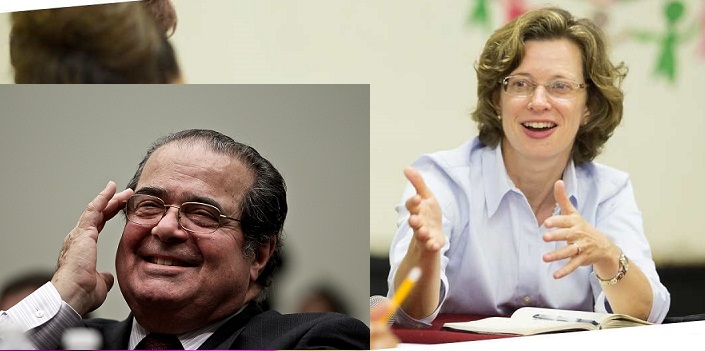Michelle Nunn Sides with Scalia on Voting Rights Act
By Melissa Cruz, Special to The Atlanta Progressive News
(APN) ATLANTA — Michelle Nunn, candidate for the Democratic nomination for U.S. Senate, has once again taken up a position that seemingly panders to a traditionally right-wing baseline.
Her position on the Voting Rights Act of 1965 (VRA) has drawn quick criticism from supporters and opponents alike. Her comments echo the sentiments of Supreme Court of the U.S. Justice Antonin Scalia in the 5-4 ruling that struck down section 4, thus halting implementation of section 5, in June 2013 in Shelby v. Holder.
In that ruling, the Supreme Court struck down the preclearance requirements that the Act had set in place for states with historically discriminatory voting practices that wished to make changes to its election procedures. Now, those states, including Georgia, are able to implement any voting changes, and the only recourse available is for the U.S. Department of Justice to bring reactionary litigation after the fact.
“I firmly believe that all states must be held to the same standards. Georgia should not be singled out for special treatment,” Nunn’s campaign wrote in a response to a voter guide produced by the League of Women Voters of Georgia and the Atlanta Journal-Constitution.
While U.S. Congress has considered a new VRA preclearance requirement that would apply to every state, no progress has been made so far, and Georgia has gone nearly a year with no preclearance requirement.
“The Supreme Court’s decision has put the onus on Congress, and I think it should work to protect the right to vote. It is fundamental to our democracy. I applaud the bipartisan work currently underway to create a nationwide standard for all states, and I look forward to working with those leaders in the Senate,” Nunn’s campaign wrote.
Nunn’s statement, while relatively optimistic, entirely glosses over years of discrimination in the states the original Voting Rights Act helped to address.
The Supreme Court ruled that Sections 4 and 5 were outdated–because they singled Georgia and other states and jurisdictions out for special treatment–and no longer necessary.
“[D]espite the tradition of equal sovereignty, the Act applies to only nine States (and several additional counties),” the narrow, right-wing majority on the Supreme Court wrote.
States and local governments did, however, have the ability to “bail-out” from Section 5. After ten successful years without violating minority voting rights, states could ask the federal trial court in Washington, D.C., to be removed from Section 5.
In addition, states or jurisdictions that exhibited a pattern of discriminatory practices could be bailed in under the now-stricken Sections 4 and 5.
Therefore, because of the bail-out and bail-in provisions–not acknowledged by Nunn–voting rights advocates said that Sections 4 and 5 were applicable to all states and jurisdictions, and did not single Georgia out for special treatment.
But with thirteen blocks made by the federal government against Georgia’s discriminatory practices within the last thirteen years, Georgia never qualified for a bail-out.
The southern state continues to be notorious in its discrimination towards voters, marginalizing through practices that had previously been struck down by the VRA.
The state came under national attention in 2010, when the American Civil Liberties Union (ACLU), the ACLU of Georgia, and the Lawyers’ Committee for Civil Rights Under Law issued a motion to the federal court in Washington, D.C., to address discriminatory practices that occurred during the 2008 presidential election.
Thousands of Georgians were unable to vote due to the state’s purposeful use of error-ridden government databases, which incorrectly flagged citizens as non-citizens. In addition to this faulty citizenship verification system, the state was also frequently requiring copies of birth certificates and other, hard to obtain documents. As a result, many citizens, including students, minorities, and seniors were unable to vote in the presidential election.
Branko “Dr. Rad” Radulovacki, one of Nunn’s opponents for the Democratic nomination, called her words “naïve and dangerous,” in a May 08 press release.
Since the June 2013 ruling, Georgia has already redrawn districts, revived practices the court had previously ruled as discriminatory, permitted openly partisan people to work in voting polls, and relocated and downsized the amount of polling places.
Fulton County, the state’s largest county, has already experienced some challenges due to redistricting.
According to Senate candidate Nunn, these changes do not call for any “special treatment” for Georgia.
“The most troubling thing about Michelle Nunn is that she is consistently moving towards the Right to appease Republican politicians. Georgia absolutely needs to be included in the preclearance regulation. When you think about it, it was already a weak requirement to begin with. By taking that away, you’re hurting the voter base,” Robert Patillo, an attorney for the Rainbow PUSH Coalition, said.
“Our current demographics actually say we should be a blue state – the only reason we’re red is because the Republicans are using every tool in their tool box to restrict access to voting to make sure we stay that way,” Patillo said. Patillo says that by allowing for less federal oversight, Georgia Republicans are able to maintain the status quo.
This is not the first time Nunn has taken right-wing positions. Progressive Democrats, including her opponents in the Democratic Primary, have criticized Nunn for supporting the Keystone XL Pipeline; for supporting the once-proposed U.S. Invasion of Syria; for opposing same-sex marriage as a matter of policy; for opposing the timely implementation of the Affordable Care Act; and for supporting the dangerous MOX nuclear fuel reprocessing plant at Savannah River Site.
See:
Syria:
http://www.ajc.com/weblogs/political-insider/2013/sep/06/michelle-nunn-backs-syria-strike/
Same-sex Marriage:
Affordable Care Act Implementation:
Keystone Pipeline:
http://time.com/14141/michelle-nun-georgia-senate-race-interview/
MOX:
http://chronicle.augusta.com/news/metro/2014-04-01/nunn-and-others-buck-obama-administration-mox
(END/2014)
